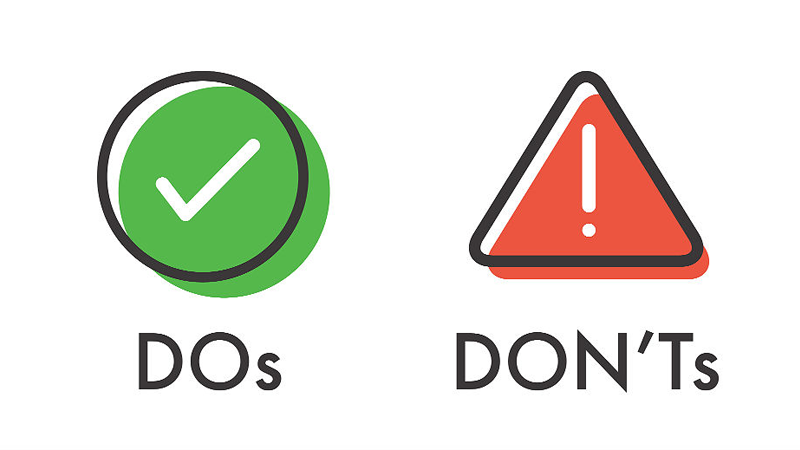Online reputations can take years to build and can also be destroyed in seconds. From responding to emails to social media posts, every facet of your online communication style effects the way your customers perceive you. Here’s Probella’s dos and don’ts for managing your business’s online reputation.
DO
1. Never Reply to Anything Publicly Unless You Have the Time to Check it at Least Twice
This applies to all forms of social media. Your brand and the tone of voice people associate with it are critical to the way you are perceived by the wider public. If there’s even a hint of sarcasm, hostility or passive aggressiveness, you can send the wrong message. Always scan tweets, Facebook posts and comments for anything that could be construed negatively. Remember, even if you own the business, this isn’t your personal account.
2. Admit Fault When You Have Made a Mistake
This is something that seems so simple yet so many companies fail to take responsibility when they have done something wrong. As the line between public and private life continues to blur, the way people interact with each other online is beginning to change. Honesty is often preferable to veiled language and non-committal expressions. Both existing and potential customers will respond well to frank admissions of any mistakes and more importantly, any steps you take to correct them.
3. Promote Other Companies and Individuals That Reflect Your Brand Values
Depending on your business niche, the people you follow and associate with online can make a significant difference to the way your customers perceive you. Being followed or endorsed by established or successful industry figures demonstrates authority and a healthy number of retweets from key influencers and other figures shows you’re fully engaged. Choose retweets and likes carefully and you can present a consistent, positive image.
4. Be Human, Whenever You Can
The digital world is now more sceptical when it comes to content that feels mechanical or impersonal. Internet users can spot text that has been created by a bot or even copied and pasted phrases in an email response. Though some time saving devices are inevitable, never allow your digital communication style to become impersonal and lacking in warmth. It might sound efficient, but it can also seem dismissive and blunt. Avoid marketing or business speak in communications designed or the public. People don’t understand it and increasingly find it incredibly grating due to its lack of clear meaning.
5. Engage with People Individually
Mass communication used to be a way one-way thing, but this hasn’t been the case for a long time. When your users respond, talk to them. Whether it’s the CEO or a temporary administration assistant who’s in charge of the social media that day, these responses are just as critical to the way you are perceived as any promotional posts you might make. It may not be possible to respond to everybody but trying to communicate with as many of your users as possible sends the right kind of message.
Don’t
1. See the Online World as Separate from the Physical One
It isn’t. Though we can turn off our phones, laptops and tablets, the online world is not something any business can turn their back on. From cyber-attacks to troll comments and public complaints, the actions of a person in the digital world can have very real and very severe consequences in real life. All businesses should be constantly monitoring all of their social media platforms, websites and any other digital presence. Reputations take time to be established but can unfortunately be destroyed in seconds.
2. Use Black Hat SEO or Other Illegal Techniques
A common misconception is that internet users will be impressed by accounts with thousands of followers or websites that consistently appear at the top of the search results. Though this is true in many cases, using illegal techniques such as buying followers or employing black hat SEO linking practices will instantly identify your organisation in a negative light. Anything that can suggest scams or the exploitation of legal grey areas for profit will make you look unprofessional and may even suggest criminality. There are no shortcuts in digital marketing. Avoid anything illegal at all costs.
3. Offer Personal Opinions if You Can Avoid Doing So
This is harder than it sounds, especially when the majority of social media is essentially a collection of people across the world who are doing just this. Remember that your business needs to appeal to as many people as possible, so inviting your followers to share their opinions and debate with each other can be excellent for engagement, you are entering potentially dangerous territory by making any claims or proclamations yourself. Some exceptions exist. Its hard to imagine anybody getting angry about a CEO who tweeted about loving ice cream, but avoid any political, sociological or religious topics in the same way you might do so at a polite family get together. Diplomacy and tact are key skills in digital communication.
4. Respond to Trolls
Unfortunately, trolls are now a fact of life online. There’s a particular style of passive aggressive, antagonistic communication that you will need to learn to identify. In almost all cases, people like this have a lot of problems and are using the medium of digital communication to vent their feelings. If you feel as if somebody is potentially damaging your online reputation through the things they are saying, simply use the block button. A polite response can be effective in some cases but when a dedicated troll is hell bent on causing problems for you, even logic and reason won’t work. Block and report any aggressive or otherwise unacceptable behaviour online. Though you do have a responsibility to engage with as many people as possible in business, nobody should be expected to tolerate behaviour that would attract the attention of the authorities if it was to be carried out in real life.






